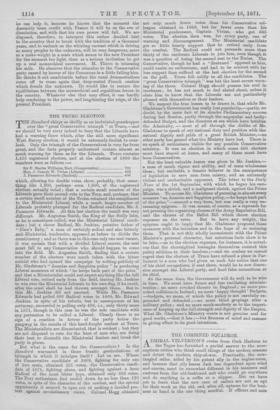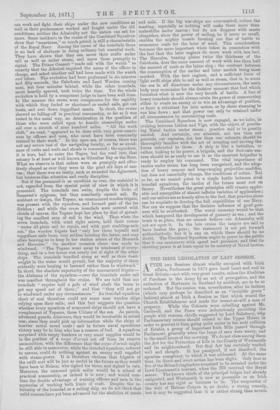THE COMBINED SQUADRON.
A DMIRAL YELVERTON'S cruise from Cork Harbour to.
the Tagus has furnished a partial answer to the over- captious critics who think small things of the modern seaman and detest the modern ship-of-war. Practically, the new- fangled sailor, aided by his potent ally in the engine-room, and because that ally leaves Jack less dependent upon wind and canvas, must be somewhat different in his manners and customs from the old-fashioned salt who could go anywhere and do anything in a coffin or a clipper. But we have yet to learn that the new race of sailors are not as opt for their work as the old, and, after all, aptness for the busi- ness in hand is the one thing needful. If officers and men can work and fight their ships under the new conditions as well as their predecessors worked and fought under the old conditions, neither the Admiralty noi the nation can ask for more. Some incidents in the cruise of the Combined Squadron show that "smartness," so much prized, is still a characteristic of the Royal Navy. Among the crews of the ironclads there is no lack of alertness in doing ordinary but essential work. They have shown that they can move their crafts under sail as well as under steam, and move them promptly to signal. The Prince Consort "made sail with the watch" so smartly that the Admiral inquired the name of the officer in charge, and asked whether sail had been made with the watch and idlers. The evolution had been performed in six minutes and fifty seconds, the Caledonia and Lord Warden coming next, but four minutes behind, while the other ironclads, more heavily sparred, took twice the time. Yet the whole evolution is held by a competent judge to have been well done. In like manner the crews were conspicuous for the rapidity with which they furled or shortened or reefed sails, got out boats, and sent down topgallant masts. In short, the cruise showed no falling-off in practical seamanship, so far as it was tested in the usual way, no deterioration in the qualities of those who were called upon to handle steamships under sail over a stretch of nine hundred miles. "All the work aloft," we read, "appeared to be done with very great smart- ness by officers and men, who must have been constantly trained to their work." In the open sea, of course, there was not any severe test of the navigating faculty, BO far as avoid- ance of rocks and reefs and shoals is concerned ; the squadron, it is true, had to enter the Tagus, but the road into that estuary is at least as well known as Gibraltar Bay or the Nore. What we observe is that orders were as promptly and effec- tively obeyed as ever they were in the good old days of can- vas; that there was no laxity, such as stranded the Agincourt, but business-like attention and ready discipline.
But if the personnel is as excellent as ever, the materiel is not, regarded from the special point of view in which it is presented. The ironclads can swim, despite the Duke of Somerset's epigram, but they manifestly cannot sail. By accident or design, the Topaze, an unarmoured wooden frigate, was present with the squadron, and formed part of the lee division ; and while the seven ironclads were covered with clouds of canvas, the Topaze kept her place by dint of spread- ing the smallest area of sail to the wind. Thus when the seven ironclads, with wind right astern, held their course "under all plain sail to royals, and with port studding-sails out," the wooden frigate had "only her three topsails and topgallant sails loose, very seldom hoisting the latter, and very often heaving-to to keep in her station astern of the Monarch and Hercules." On another occasion chase was made to windward. "The Topaze went away to windward of every- thing, and in a few hours was nearly out of sight of the other ships. The ironclads bundled along as well as their dead- weight in the water would permit, but the majority of them evidently were beating to leeward rather than to windward." In short, the absolute superiority of the unarmoured frigate— the Alabama of the squadron—over the ironclads under sail was manifest throughout the cruise. We are told that our ironclads "require half a gale of wind abaft the beam to get any speed out of them ;" and that "they will not go to windward under any circumstances." An ironclad squadron short of coal therefore could not come near wooden ships relying upon their sails ; and this fact suggests the question whether every squadron of armoured ships should not have a complement of Topazes, those Uhlans of the sea. As patrols, advanced guards, dclaireurs, they would be invaluable in actual war, since they could pick up information while the ships of heavier metal saved coals ; and in future naval operations victory may be to him who has a reserve of fuel. A squadron surprised with empty bunkers or very scant supplies would be in the position of a corps d'arnze'e out off from its reserve ammunition, with the difference that the corps d'arnte'e might be still able to manoeuvre, while the ironclad squadron, reduced to canvas, could do nothing against an enemy well supplied with steam-power. It is therefore obvious that frigates of the swift sort will be just as useful in the future as they would have been to Nelson, who sighed for them, and sighed in vain. Moreover, the unarmed quick sailer would be a school of practical seamanship, as indeed it is now ; and would com- bine the double advantage of training officers and men in the mysteries of working both kinds of craft. Despite the in- feriority of the ironclad as a sailing ship, we do not think that valid reasons have yet been advanced for the abolition of masts and sails. If the big war-ships are over-masted, reduce the masting, especially as nothing will make them more than makeshifts under canvas ; but do not disppnse with masts altogether, since the power of sailing, be it never so small, enables the mighty vessels forming our line of battle to economize coals for the hour of need. This consideration becomes the more important when taken in connection with the fact that the later engines do more work with less fuel. The Hercules, bearing plates twice the thickness of the Caledonia, does the same amount of work with less than half the amount of coals as the latter ship ; the contrast between the consumption of the earlier and later models being most marked. With the best engines, and a sufficient force of light swift ships able to sail as well as steam, that is, to scour the sea in all directions under any circumstances, the main body may economize for the decisive moment that fuel which furnishes what is now the very breath of battle. A line of heavy ironclads should always retain the power of manoeuvring either to evade an enemy or to win an advantage of position, or force a reluctant foe into action, or by sheer steaming to run him down ; and that power can only be retained under all circumstances by economizing coals.
The Combined Squadron is now engaged, as we infer, in cruising between Lisbon and Vigo, with the object of practis- ing Naval tactics under steam; practice said to be greatly needed. And certainly, our admirals, not leas than our generals, our captains, not less than our colonels, should be thoroughly familiar with the art of arraying and moving the forces entrusted to them. A ship is like a battalion, or rather, looking to its power, a brigade, and the first-rate sea- man should be as ready to use it as the smartest brigadier is ready to employ his command. The vital importance of tactics under steam has long been recognized, and the adop- tion of heavy armour and long-ranging projectiles modifies, but does not essentially change, the conditions of action. But so far, as we cannot point to a single battle between rival ironclad squadrons, the tactics of the future must rest on theory. Nevertheless the great principles still remain applic- able and susceptible of almost infinite varieties of application ; and our sailors are so keenly alive to the fact, that practice alone can be requisite to develop the full capabilities of our Navy. Nor can we suppose that the decisive influence of good gun- ners will be overlooked. The worst economy would be that which hampered the development of gunnery at sea ; and the truth is so plain, that wo cannot believe our Admiralty will not act upon it. In the late cruise the targets are said to have beaten the guns ; the statement is not put forward authoritatively, but it is one on which there should be no doubt. The Combined Squadron ought to prove to the public that it can manoeuvre with speed and precision, and that its shooting power is at least equal to its mastery of Naval tactics.































 Previous page
Previous page